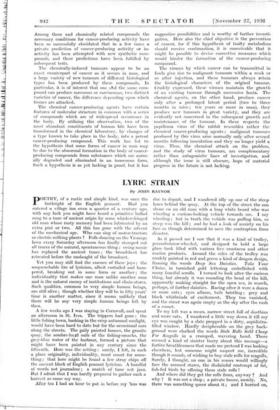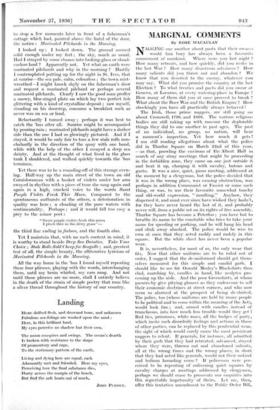LYRIC STRAIN
By JOHN RAYNOR
Yet you may still find the essence of these joys ; the • unquenchable fire of lyricism, albeit curtailed and ham- pered, breaking out . in some form or another ; the individuality that makes one man unlike another man and is the natural enemy of institutions and chain-stores. Such qualities, common to very simple human beings, are still alive ; though whether they will be in fifty years' time is another matter, since it seems unlikely that there will be any very simple human beings left by then.
A few weeks ago I was staying in Cornwall,.and spent an afternoon in St. Ives. The trippers had gone ; the little fishing town, basking in the crisp autumnal sunlight, would have been hard to date but for the occasional cars along the streets. The gaily painted houses, the granite quay, the sombre-hu-Jd sails of the fishing-smacks, the grey-blue water of the harbour, formed a picture that might have been painted in any century since the fifteenth. Here was the setting : surely, I felt, in such a place originality, individuality, must count for some- thing ; that here might be found a few stray chips off the ancient block of English peasant lyricism. A handful of words not journalese ; a snatch of tune not jazz. But I admit that I was hardly prepared to gather such a harvest as came my way.
After tea I had an hour to put in before my 'bus was due to depart, and I wandered idly up one of the steep lanes behind the quay. At the top of the street the sun shone on an old man with a long white beard who was wheeling a curious-looking vehicle towards me. I say wheeling ; but in truth the vehicle was pulling him, so steep was the hill ; and he had a look of anxiety on his face as though determined to save the contraption from disaster.
As it passed me I saw that it was a kind of trolley, perambulator-wheeled, and ..designed to hold a large glass tank filled with various live crustacea and other marine products. Around the sides of the trolley seas crudely painted in red and. green a kind of dragon design, framing the words Deep Sea Dainties. Take Your Choice, in tarnished gold lettering embellished with many fanciful scrolls. I turned to look after the curious thing, but already it was rounding the bend of the hill, apparently making straight for the open sea, in • search, perhaps, of further dainties. Racing after it were a dozen or more cats ; eyes aflame, tails bristling ; grey and black whirlwinds of excitement. They too vanished, and the street was again empty as_the sky after the rush of a comet.
To my left was a mean, narrow street full of dustbins and more cats. I wandered a little way down it till my eye was caught by a slate propped in a dirty, aspidistra- filled window. Hardly decipherable on the grey back- ground were chalked the words Stale Rolls Sold Cheap For Seagulls in a cramped, wavering hand. There seemed a kind of sinister hurry about this message—a furtive breathlessness that made me pretend' I was looking elsewhere, lest someone might suspect me, incredible though it sounds, of wishing to buy stale rolls for seagulls. • Surely, I thought, no .one in his senses would .7illingly face the amused stares, the disdainful contempt of fat, fish-fed birds by offering them stale rolls !
And where did they get the rolls from, anyway ? And why ? It was not a shop ; a private house, merely. No, there was something queer about it ; and I hurried on, to stop a few moments later in front of a fisherman's cottage which had, painted above the lintel of the door, the notice : Marinated Pilchards in the Morning.
I looked up ; I looked down. The ground seemed solid enough under my feet ; the sky, much as .usual. Had I strayed by some chance into looking-glass.or cloud- cuckoo land ? Apparently not. Yet what on earth were marinated pilchards and why in the morning ? Hastily I contemplated putting up for the night in St. Ives, that at sunrise—the sea pale, calm, colourless ; the town mist- wreathed—I might knock shyly on the fisherman's door and request a marinated pilchard or perhaps several marinated pilchards. Clearly I saw the good man proffer a snowy, blue-ringed plate on which lay two perfect fish glittering with a kind of crystalline deposit ; saw myself, standing on his doorstep, consume a breakfast such as never was on sea or land.
Reluctantly I turned away ; perhaps it was best to catch the 'bus after all. Sunrise might be accompanied by pouring rain ; marinated pilchards might have a darker side than the one I had so glowingly pictured. And if I stayed, it would be only fair to toss a few stale rolls non- chalantly in the direction of the quay with one hand, while with the help of the other I essayed a deep sea dainty. And at the thought of what lived in the glass tank I shuddered, and walked quickly towards the 'bus terminus.
Yet there was to be a rounding-off of this strange even- ing. Half-way up the main street of the town an old Cornishwoman with a basket of violets under her arm swayed in rhythm with a piece of tune she sang again and again in a high, cracked voice to the words Sweet Purple Violets Fresh This Morn. Compared to the spontaneous outbursts of the others, a deterioration in quality was here ; a clouding of the pure waters with sentimentality. Perhaps ; and it would fall too easy a prey to the minor poet :
" Sweet purple violets fresh this morn I pluck thee in the dewy grass"—
the third line ending in forlorn, and the fourth alas.
Yet I maintain that, with no such context in mind, it is worthy to stand beside Deep Sea Dainties. Take Your Choice ; Stale Rolls Sold Cheap for Seagulls ; and, greatest test of all, the simple beauty, the alliterative lyricism of Marinated Pilchards in the Morning.
All the way home in the 'bus I found myself repeating these four phrases, playing with the words, interchanging them, until my brain whirled, my ears rang. And not until those phrases are no more, shall I entirely believe in the death of the strain of simple poetry that runs like a silver thread throughout the history of our country.















































 Previous page
Previous page